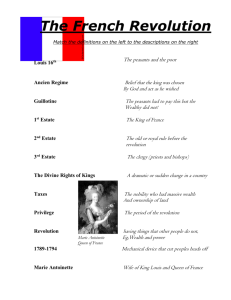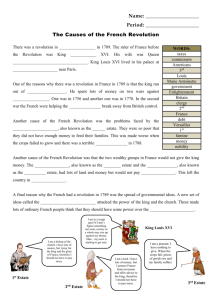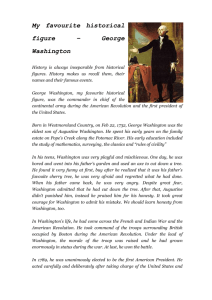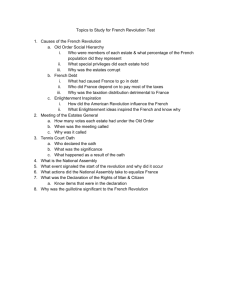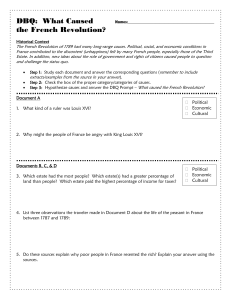Question: The French Revolution had many causes and some
advertisement
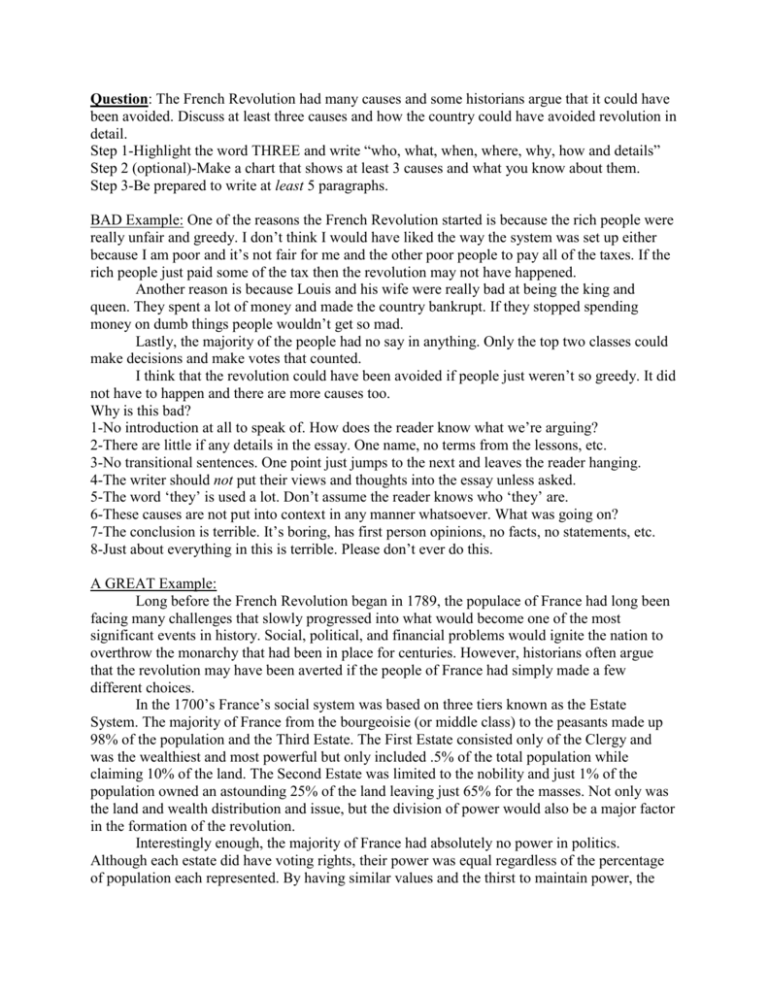
Question: The French Revolution had many causes and some historians argue that it could have been avoided. Discuss at least three causes and how the country could have avoided revolution in detail. Step 1-Highlight the word THREE and write “who, what, when, where, why, how and details” Step 2 (optional)-Make a chart that shows at least 3 causes and what you know about them. Step 3-Be prepared to write at least 5 paragraphs. BAD Example: One of the reasons the French Revolution started is because the rich people were really unfair and greedy. I don’t think I would have liked the way the system was set up either because I am poor and it’s not fair for me and the other poor people to pay all of the taxes. If the rich people just paid some of the tax then the revolution may not have happened. Another reason is because Louis and his wife were really bad at being the king and queen. They spent a lot of money and made the country bankrupt. If they stopped spending money on dumb things people wouldn’t get so mad. Lastly, the majority of the people had no say in anything. Only the top two classes could make decisions and make votes that counted. I think that the revolution could have been avoided if people just weren’t so greedy. It did not have to happen and there are more causes too. Why is this bad? 1-No introduction at all to speak of. How does the reader know what we’re arguing? 2-There are little if any details in the essay. One name, no terms from the lessons, etc. 3-No transitional sentences. One point just jumps to the next and leaves the reader hanging. 4-The writer should not put their views and thoughts into the essay unless asked. 5-The word ‘they’ is used a lot. Don’t assume the reader knows who ‘they’ are. 6-These causes are not put into context in any manner whatsoever. What was going on? 7-The conclusion is terrible. It’s boring, has first person opinions, no facts, no statements, etc. 8-Just about everything in this is terrible. Please don’t ever do this. A GREAT Example: Long before the French Revolution began in 1789, the populace of France had long been facing many challenges that slowly progressed into what would become one of the most significant events in history. Social, political, and financial problems would ignite the nation to overthrow the monarchy that had been in place for centuries. However, historians often argue that the revolution may have been averted if the people of France had simply made a few different choices. In the 1700’s France’s social system was based on three tiers known as the Estate System. The majority of France from the bourgeoisie (or middle class) to the peasants made up 98% of the population and the Third Estate. The First Estate consisted only of the Clergy and was the wealthiest and most powerful but only included .5% of the total population while claiming 10% of the land. The Second Estate was limited to the nobility and just 1% of the population owned an astounding 25% of the land leaving just 65% for the masses. Not only was the land and wealth distribution and issue, but the division of power would also be a major factor in the formation of the revolution. Interestingly enough, the majority of France had absolutely no power in politics. Although each estate did have voting rights, their power was equal regardless of the percentage of population each represented. By having similar values and the thirst to maintain power, the first and second estates often voted together on affairs which ultimately silenced the third estate by creating a two to one vote. With an overwhelming 98% of the population silenced in political affairs it was only a matter of time until the people would come together. To make matters worse, the country had been bankrupted by its monarchy. Louis XVI and his wife, Marie Antoinette spent enormous amounts of money and flaunted it. Whether it was keeping and expanding the Palace at Versailles or sporting the latest fashion, the government spending had no respect or consideration for the Third Estate which paid 100% of the tax burden. As all of these conditions lingered the leaders of France called for a meeting to resolve the issues within the country but in the end they failed to make any significant changes and the people would rise up. It is easily argued that the revolution could have been postponed or altogether averted if the leaders and first two estates accepted minor changes. The ongoing unfairness forced on the Third Estate created an angry and easily influenced mob that Joseph Sieyes, a revolutionary leader, deemed ‘the nation’. Perhaps if the wealthy members gave up a small percentage of land or even paid a portion of the taxes France could have not only avoided revolution but become more powerful at this point in time. The summer of 1789 proved to be the downfall of the monarchy as leaders such as Jacques Necker were dismissed from their positions for supporting the Third Estate and suggesting that the Clergy and nobility sacrifice for the whole country. At several meetings called different leaders suggested these types of options and all were declined repeatedly, upsetting the people of France and essentially pushing them to take a stand at the Bastille on July 14, 1789. Whether or not the French Revolution could have been avoided will never be known but there are many ways to see that it could have. When the French Revolution ended in 1799 with Napoleon taking over in a coup de tat to become First Consul and establish a republic, the world had been given a great example of how to replace a government that does not work. Without the French Revolution having happened, many other countries would not have changed according to the model set in the late 18th century. Why is this great? 1-It has an introduction, body, and conclusion. 2-All the requirements of the essay are met. 3-Each paragraph flows into the next without abruptly changing. 4-Details are used several times. Names, dates, numbers, titles, etc. 5-There are no instances of first person points of view. 6-The body supports the thesis. 7-The conclusion includes new information and reiterates the arguments made. What could be better? 1-There are some sentences that could be combined and made more concise. 2-More background information could be given, especially if it was a paper without time constraints. 3-Details about what happened could be included to support the information given. 4-There are instances when proper nouns are not consistently capitalized (First Estate/first estate) Practice: Highlight the sentences that help move from one paragraph to another smoothly.

